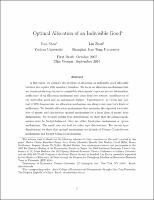Please use this identifier to cite or link to this item:
https://hdl.handle.net/20.500.12202/4017Full metadata record
| DC Field | Value | Language |
|---|---|---|
| dc.contributor.author | Shao, Ran | |
| dc.contributor.author | Zhou, Lin | |
| dc.date.accessioned | 2018-10-22T18:31:23Z | |
| dc.date.available | 2018-10-22T18:31:23Z | |
| dc.date.issued | 2016-11 | |
| dc.identifier.citation | Shao, Ran & Zhou, Lin. November 2016. Optimal allocation of an indivisible Good. Games and Economic Behavior.100, 95-112. | en_US |
| dc.identifier.issn | 0899-8256 | |
| dc.identifier.uri | https://doi.org/10.1016/j.geb.2016.09.004 | en_US |
| dc.identifier.uri | https://hdl.handle.net/20.500.12202/4017 | |
| dc.description | In this paper, we consider the problem of allocating an indivisible good efficiently between two agents when agents' valuations of the good are private information. | en_US |
| dc.description.abstract | In this paper, we consider the problem of allocating an indivisible good efficiently between two agents with monetary transfers. We focus on allocation mechanisms that are dominant-strategy incentive compatible when agents' types are private information. Inefficiency of an allocation mechanism may come from two sources: misallocation of the indivisible good and an imbalanced budget. Unfortunately, as Green and Laffont (1979) demonstrate, no allocation mechanism can always overcome both kinds of inefficiency. We identify allocation mechanisms that maximize the expected total utilities of agents, and characterize optimal mechanisms for a large class of agents' type distributions. For strongly regular type distributions, we show that the optimal mechanisms must be budget-balanced: they are either fixed-price mechanisms or option mechanisms. The result may not hold for other type distributions. For certain type distributions, we show that optimal mechanisms are hybrids of Vickrey–Clarke–Groves mechanisms and budget-balanced mechanisms. | en_US |
| dc.description.sponsorship | Lin Zhou's research is supported by the Ministry of Education of China through the Program for Changjiang Scholars and Innovative Research Team in University (IRT13030). | en_US |
| dc.language.iso | en_US | en_US |
| dc.publisher | Elsevier | en_US |
| dc.rights | Attribution-NonCommercial-NoDerivs 3.0 United States | * |
| dc.rights.uri | http://creativecommons.org/licenses/by-nc-nd/3.0/us/ | * |
| dc.subject | Dominance incentive mechanisms | en_US |
| dc.subject | Average efficiency | en_US |
| dc.subject | Fixed-price mechanisms | en_US |
| dc.subject | Option mechanisms | en_US |
| dc.subject | Budget balance | en_US |
| dc.title | Optimal Allocation of an Indivisible Good. | en_US |
| dc.type | Article | en_US |
| dc.contributor.orcid | 0000-0002-1736-9862 | |
| local.yu.facultypage | https://www.yu.edu/faculty/pages/shao-ran | |
| Appears in Collections: | Sy Syms School of Business (SSSB) -- Faculty Publications | |
Files in This Item:
| File | Description | Size | Format | |
|---|---|---|---|---|
| Shao Zhou Nov2016 Optimal Allocation gebR4 Sep 5.pdf | 321.53 kB | Adobe PDF |  View/Open |
This item is licensed under a Creative Commons License

